Matters Of The Mind
"We work more closely now than we did in the beginning. It’s always a different experience, but it’s hard to put a finger on exactly why each time is different…"

Thanks to a slight navigational error (one that forced more of a jog than anticipated), The Music arrived somewhat flustered to see Tim Hoey sitting cool and tranquil. In front of him was an undisturbed mug of water, and in front of this writer's now-seated self was a mug near-identical to his, differentiated only by the depleted quantity of water. As composure was regained, Hoey watched as a recording device was mounted and put on the ready, before commenting on the primitive nature of the piece as outdated (and underrated) technology. “It's like we've gone back to the early 2000s!” His remark almost came off as hyperbolic – as though the time between then and now was not a decade ago, but a century. The rather confronting reality is that it was around this seemingly distant timeframe that Cut Copy released their debut album. Nine years later, they've hit record number four.
“Working together changes all the time,” remarks Hoey, reflecting on the collective time they've spent working together from their formation in 2001 to the past year spent recording Free Your Mind. “We work more closely now than we did in the beginning. It's always a different experience, but it's hard to put a finger on exactly why each time is different… We've been fortunate in that we were friends before the band started and we've been able to maintain our friendship throughout the course of the career, which is amazing, because you often see bands that come and go and then they don't talk to each other.
“It was interesting this time in the beginning, because Dan [Whitford – frontman] and I were listening to completely different music, but on previous records we found that we had certain ideas or bands that we were listening to that were overlapping. This time, I was not even really interested in dance music. For the entire year, I didn't listen to any dance music, I didn't DJ or anything and then Dan was listening to a lot of house music and writing a lot of house tracks, whereas I was doing weird…” He pauses and momentarily racks his brain before continuing. “I don't even know what it is. Like, very – sedated music, I guess. So rather than fight we just applied what we were doing to those ideas [for the record].”
Now with an increased variety of influences behind them, Cut Copy took to approaching nearly every aspect of this record differently. During the year leading up to the release of Free Your Mind, Cut Copy had taken the reins for promoting the soon-to-be-released albums. In an attempt to create an experience transcending one that is simply aural, they've taken the album out into the real world, erecting billboards displaying the phrase Free Your Mind in six locations around the world, from the ghettos of Detroit to our very own outback backyard. Chosen based on the distance between one another and as a way to involve the world, these locations were (for a short while) the only places that fans were able to access the album's title track/lead single. Hoey explains that it was also a method to “bring people together” and “get them out into the world”.
Don't miss a beat with our FREE daily newsletter
“I had the idea of doing a billboard project back in art school.” With a hint of pride, Hoey explains the origins of the more grandiose of the two real world experiences offered to fans prior to Free Your Mind's impending official release (the other being a live vinyl cutting of the album's first single, Let Me Show You). “We had the idea last year when we were making this record that when we released music into the world, we wanted to do it differently to how we've done it before. We always think it's such an anti-climax to work on this record for months or years or whatever, and then when it's put up on YouTube or on iTunes or SoundCloud, people go and listen to it and then it goes away. It feels like it's a very short window for it to be released into the world and exist before people move on, so we had this idea of using real world events.”
With some reinforcement from these real world projects, Free Your Mind morphed into a concept album, linked thematically (and accidentally) by recurring notions of a sense of euphoria and a slight spiritual undercurrent. When asked if he himself is a particularly spiritual man, Hoey sits on the question. “It's been an interesting year. There's been so much craziness going on in and around the band. It's very interesting that we've made such an uplifting and positive record.” Another pause. “But… Yeah.”









